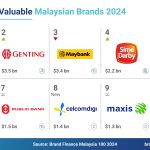(Marketingmagazine.com.my) – Over the past decade, it has become clear that the way we measure the value of businesses has changed completely.
Traditionally, value has been understood to relate to tangible assets: the physical things that can be seen and touched; everything from hard cash and inventory to plant machinery and office buildings.
Not so today. Increasingly, real business value is seen as lying in intangible assets: things with no corporeal form but nevertheless, hugely valuable, for example, a company’s intellectual property, its brand or its human resources.
Intangible assets have been behind some of the biggest IPOs and valuations we have seen in recent years. Think about Facebook (peak market capitalization of over $104 billion), and Twitter (estimated market capitalization of $12.67 billion)..
It is their intangible assets that make them so valuable: their customer data, their algorithms, the access to data, intelligence, use of data and their brands.
This fundamental shift in how value is understood brings with it some real challenges for the finance function of businesses.
If finance function is to understand and demonstrate the true value of their business, it must be able to accurately analyse and measure, and report on intangibles in the world where both structured data and unstructured data exist in their systems.
This requires understanding what these new assets are, establishing KPIs against them and measuring the performance of these new assets.
This data must then be reported in a transparent and clear way to investors, shareholders, customers and other relevant stakeholders.
As we can see now, more and more intelligence and value are extracted by bringing both these structured data and unstructured data together.
Therefore, it seems clear that if finance is to accurately understand the value of their business then data management is crucial.
Finance must be able to effortlessly draw on information from all lines of business and operations, and bring this data together in a single source of truth.
Moreover, for finance to be able to create a compelling narrative around this data, it must work hand-in-hand with all lines of business managers to understand the full implications of what the data is telling them.
In this model, finance is the guidance system for the business, connecting all the various departments and stakeholders to find, understand and report on value.
To enable this vision however, finance needs to transform the way it operates. The days of spreadsheets and manual processes are over for the ‘last mile’ of reporting.
If the value of assets are to be measured accurately, the back and forth between finance and business managers must be kept to a minimum, as not only does it delay reporting but it provides scope for errors to slip in to the process.
Instead, finance needs a system that can provide workflow and security (to ensure only those who have access to sensitive data can see it) while guaranteeing that data is automatically kept current and correct.
On top of that, finance cannot simply rely on standard ERP systems but need to expand into line of business systems and further into complex predictive systems that work on large data lakes in the world of BIG DATA.
The modern cloud-based enterprise performance management systems tick all of these boxes and for this reason, I fully expect to see them dominate the last mile of reporting in the near future.
They provide a system of systematically trawling the business for valuable intangible assets like “intelligence”, “knowledge”, analytics and then bringing them together in a narrative-driven report.
The outcome is a finance team that is better able to accurately measure their business’ worth and report it in a transparent way to stakeholders.
Enter the prestigious APPIES Malaysia Marketing Awards today!
Known as the ‘TED for Marketing’, campaign entries are presented by their brand marketers or campaign creators in an interactive format comprising of a 4-minute creative reel summarising the overall marketing campaign, followed by a 6-minute oral presentation highlighting significant aspects of the campaign, and finally a Q&A with the audience.
Entrant campaigns must have run between 1 January 2015 and 29 February 2016 in any of these categories:
1. Consumer Durables
2. Consumer Services
3. Food and Beverage
4. Non-food FMCG
5. Business Services
6. Government, Cultural, Social and Environmental campaigns.
Top brands including P&G, Mondelez International, Coca-Cola, Google, IKEA, IBM,
Unilever, Amazon, Shangri-La Hotels & Resorts and Asia Pacific Breweries have
all won at the APPIES over the years. Will your Brand or Agency be next?
Download details and your Entry Kit here:
Closing Date: 31 March, 2016
All entries are to be submitted to [email protected] via file transfer protocol.
MARKETING Magazine is not responsible for the content of external sites.



